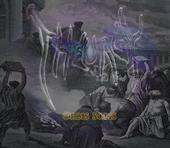Myspace Layouts - Myspace Editor - Image Hosting
Theurgy is a compilement of old stuff that me and an older band i was in called "Belligerent Drunken Warmaster" wrote, plus some original recordings that i produced on my own.I will not be posting a million bulletins on this page, or have a political agenda on this page, so dont expect any political bulletins out of this page.This is just for the love of art and music, and in this case death/grindcore metal, unfortunately without vocals. I wouldnt give it up for the world.Let me know if you like it.A heads up to musicians who would like to participate in this project, im looking for everything(bass, guitar, drums, sequence modulation) except for vocals. I will personally take care of that position, but back up vocals are acceptable as well, because there will be need for tonality exchanges between two to three voices in some parts, but of course under the raspy filter of deathmetal grindcore style vocals.
Let me know if you want to jam, and i will get back to as soon as i can.
Taken From: "The New Encyclopedia of the Occult" By John Michael Greer
Theurgy/Thaumaturgy
Theurgy(Greek theurgeia, from theos, "god", and ergeia, "work")
In ancient times, the magical wing of Platonism, which adopted ceremonial magic and traditional religious ritual as a process of purification needed to cleanse the lower aspects of the self and lay the foundation for the higher work of philisophical contemplation. Theurgy evolved as a distinct school in the first centuries of the Common Era, as part of the same fusion of Platonic philosophy and popular occultism that also brought about the creation of Hermeticism and many Gnostic traditions. The major figure in the formation of theurgy was Iamblichus of Chalcis(?- c. 330).
The theurgists led what was very nearly the last organized resistance against Christianity in the classical world. Julian, the last Pagan Emperor of Rome, was a committed theurgist and a close student of Iamblichus' writings, and the great resurgence of Pagan thought and practice in the 4th century relied heavily on theurgy as both a philosophical stance and a basis for mutual toleration and support. Even after the political defeat of Paganism, theurgists such as Proclus and Sosipatra continued to teach and practice. The tradition dwindled out slowly on the fringes of the Byzantine Empire, and there is reason to believe that it survived in outposts such as Harran until the Middle Ages.
The language of theurgy and some of its practices were revived in the Renaissance in the wake of Marsilio Ficino's epochal translation of the Hermetic treatise(Corpus Hermeticum). With the spread of knowledge about classical Platonism and Hermeticism in the Renaissance, theurgy became an important element in the occult traditions of the time, and is discussed at length in such classic Renaissance occult works as Heinrich Cornelius Agrippa's "Three Books of Occult Philosophy"(1531).
In recent usage, the term theurgy has come to referr to any form of magic that aims at the spiritual transformation of the magician---which, admittedly, was the primary goal of classical theurgy. Several variant meanings exist however. In some French esoteric Christian systems, the word is used for a system of focused contemplative prayer that aims at practical, as well as spiritual goals.(Research Christian Occultism). In some modern Pagan circles, it is used for any magical working that calls on the gods, as distinct from thaumaturgy, which uses the powers in natural substances or the magician himself or herself.
Thaumaturgy(Greek thaumaturgeia, from thaumata, "wonders", and ergon "work")
The branch of magical practice directed toward causing change in the universe of experience. It is contrasted with theurgy, the branch of magical practice directed toward the transformation of the magician.
In some modern Pagan traditions, "thaumaturgy" is used to mean magic that is done without invoking divine energies, while "theurgy" is magic in which the gods are invoked.
